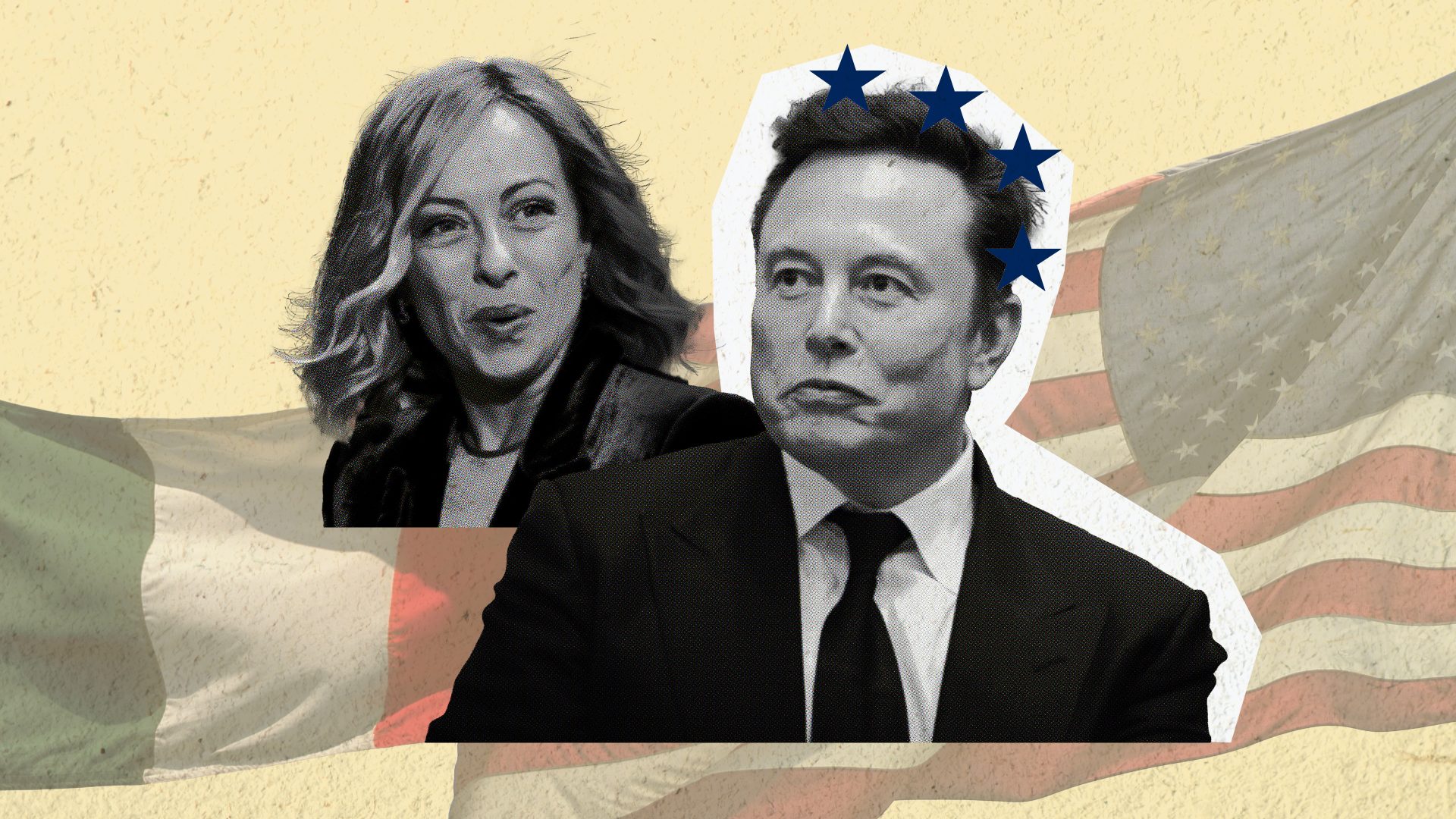The friendship between Italian prime minister Giorgia Meloni and Elon Musk is the talk of Italy, and increasingly so since the latter secured a key role in the incoming administration of US president-elect Donald Trump.
The two first expressed their mutual admiration in an official picture during Musk’s visit to the Italian prime minister’s official residence, Palazzo Chigi, in June 2023. Six months later, Musk was a special guest at Atreju, an event for young members of Meloni’s party, Brothers of Italy.
At the end of October 2024, Musk was a guest at the Global Citizen Awards, hosted by the US thinktank, the Atlantic Council. There, apparently at her request, he was the one to present Meloni with an award she was being given for her contributions to the transatlantic relationship.
Soon after Trump’s victory, Meloni said on X (formerly Twitter) that Musk had been in touch and that she sees the Trump presidency as a “valuable asset for both the United States and Italy”.
And, most recently, Meloni, Trump and Musk were pictured together at an event in Paris to mark the reopening of Notre Dame cathedral following the fire there five years ago.
An analysis of Musk’s activity on Twitter and X by the Economist shows that over the last two years, he has become increasingly political in his messaging – particularly when it comes to posting about free speech and immigration. This goes some way to explaining why he has become a major political operative in the US and is now forging allegiances in Europe on the right of the political spectrum.
Musk is an enemy of open borders yet has criticised the legal immigration process in the US for being “ridiculously slow and difficult”. Ironically, his own immigrant status in the US has been put under scrutiny. The Washington Post reported that Musk worked in the US illegally in 1995 after quitting school. Musk, however, denies this.
Meloni has long been tough on immigration. Recently, her government reached an agreement with Albania to deport asylum seekers arriving in Italy to Italian-operated reception facilities in Albania. There, they will be processed and anyone failing in their request to enter Italy would be sent back to their country of origin.
The agreement, which effectively outsources Italy’s migration system to Albania, has been blocked by an Italian court. Musk reacted sharply to this on X by criticising the Italian judiciary and saying: “These judges need to go”.
But, he was thereby putting Meloni in a difficult position. In an uncommon show of displeasure, President Sergio Mattarella issued a strongly worded rebuttal to Musk’s intervention. He warned the tech billionaire not to interfere in his country’s constitutional processes.
“Anyone, especially if, as announced, they are about to take on an important government role in a friendly and allied country, must respect its sovereignty and cannot take on the task of issuing prescriptions,” said Mattarella.
Another shared stance between Musk and Meloni is their evident frustration with what they perceive as woke conformism. Musk has claimed a “woke mind virus” is limiting free speech in the US. Meloni has also attacked the “woke ideology” that, she argues, is destroying the foundations of the natural family.
She should, however, be cautious of building an alliance with Musk on these terms. He is an entrepreneur and a disruptor, free to speak his mind without restraint. She is a prime minister – a public servant to a democracy. She thereby operates within far stricter institutional boundaries.
Potential business deals also serve as a significant unifying factor. It seems increasingly likely that Musk’s Starlink will expand substantially into Italy. In October, the government confirmed it was testing Starlink satellites as a way to boost internet connectivity in areas of poor coverage.
This development is creating ripples across the Italian telecommunications sector. If Musk starts winning contracts that might have otherwise gone to domestic companies, this could pose a political challenge for Meloni, who tends to take a nationalist stance on most things.
For Meloni, closeness to Musk is closeness to Trump. But there are risks ahead. Musk has a strong preference for deregulation and has been hired to cut costs in Trump’s government. These views are poorly aligned with the principles of Meloni’s social nationalist party.
She has safeguarded national production by implementing policies to protect what she terms “made in Italy”. This includes incentives for companies to keep their production in Italy. Stricter trade barriers in the US would harm Italian exports.
Meloni might aim to leverage her connections with Musk and Trump to safeguard Italian interests but this expectation may be unrealistic. Trade policies would likely affect all EU countries equally, and even if Italy were to secure a more favourable deal, a significant portion of Italian exports consists of intermediate goods destined for other EU countries, which ultimately sell to the US.
Nationalists often end up having strained relationships once the realities of office in a globalised world kick in – and Meloni and Musk may follow a familiar pattern from here on. They might share mutual admiration, but their domestic priorities are often too dominant to focus on international partnerships.
Vincenzo Galasso, Professor of Economics, Bocconi University
This article is republished from The Conversation under a Creative Commons license. Read the original article.









